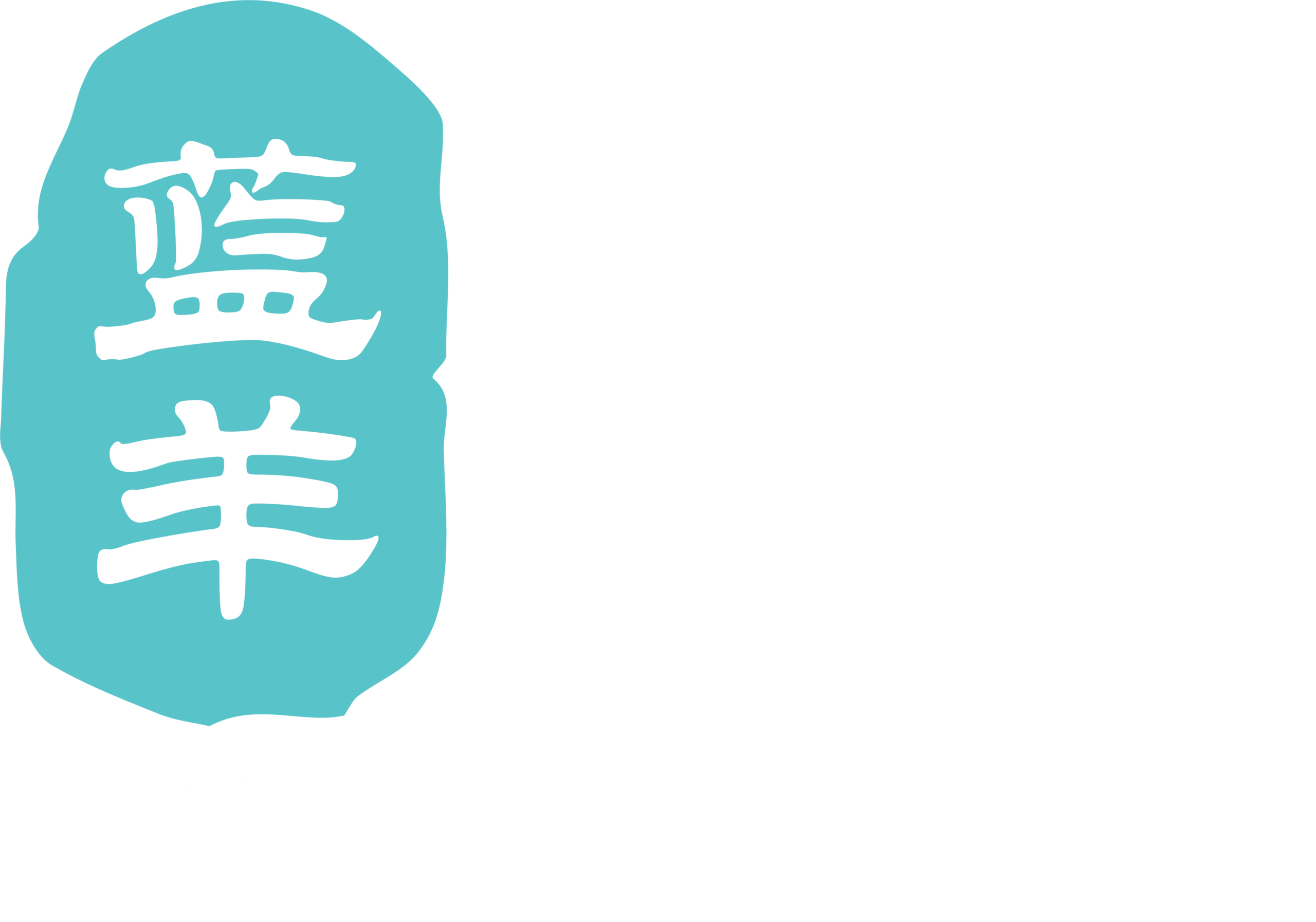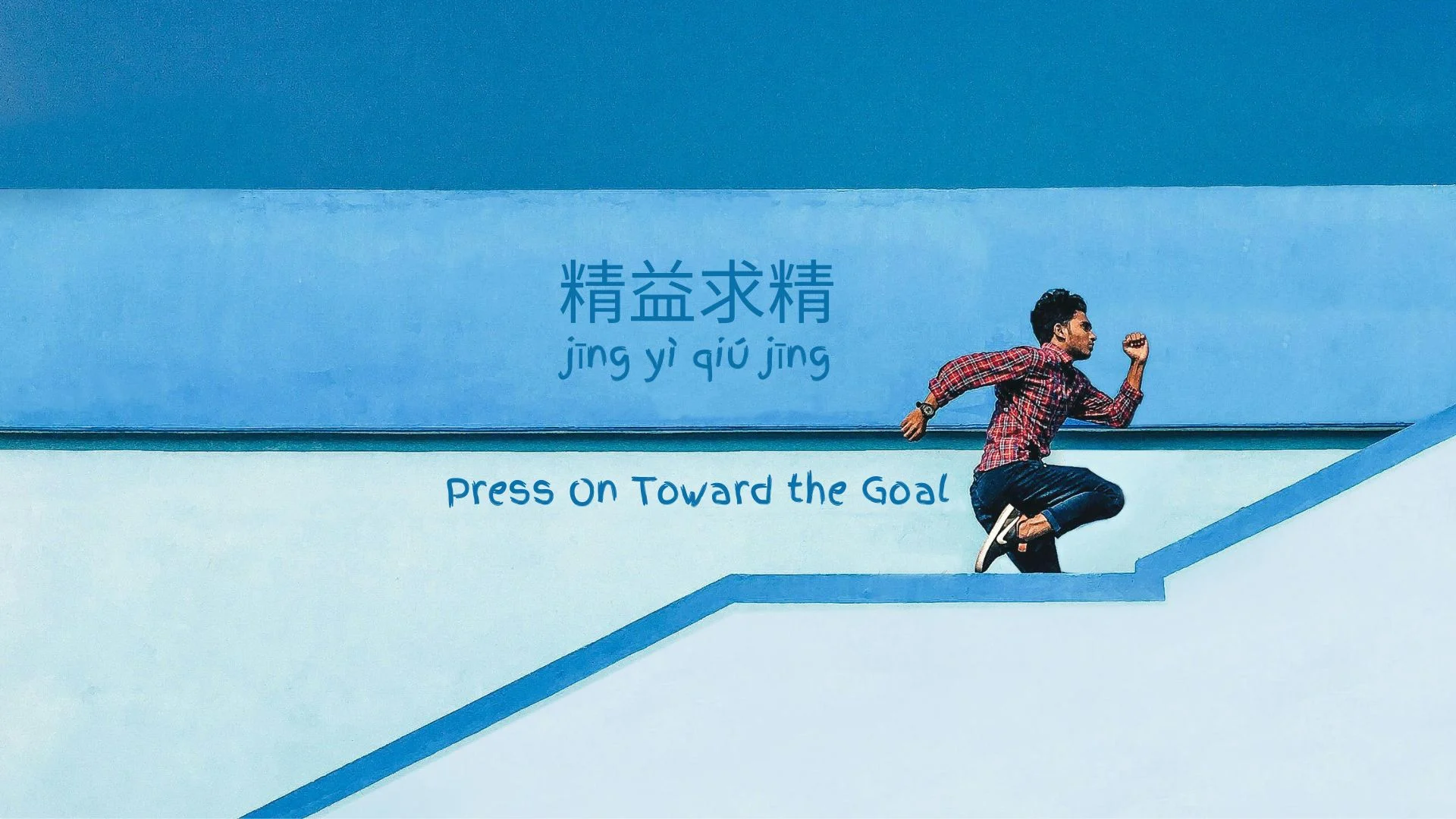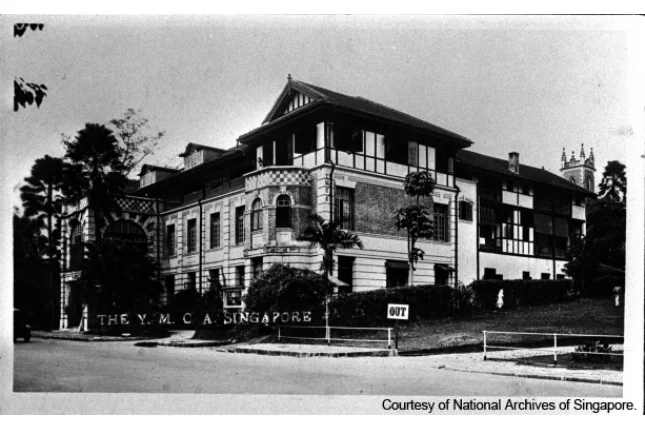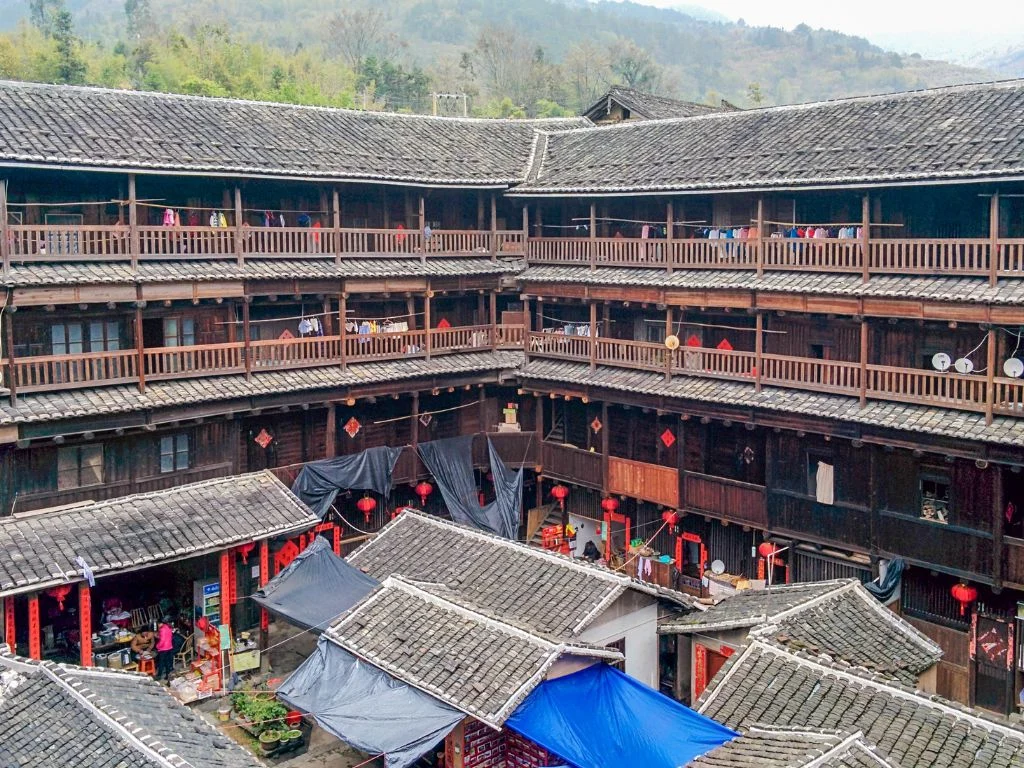In 2009, my parents made a pilgrimage back to the mountainous region of Dabu County, Guangdong Province, carrying with them a mission that would have been familiar to countless generations before them. They had come seeking the proper generation character for their first grandson—a journey that connected them to a family story stretching back nearly a millennium. What they found was the character 裕 (yù), the 28th character of the poem, representing the 28th generation. It was not just a single character, but the living continuation of a family story that had survived dynasties and global migrations.
The Dabu Lam family’s generation poem has guided the naming of countless generations for over eight centuries, serving as more than a genealogical tool—it is a living testament to one family’s remarkable journey through the rise and fall of dynasties, migrations across continents, and the preservation of cultural identity against all odds. Each character in this forty-word verse carries within it the weight of ancestral dreams and the promise of future prosperity, connecting modern descendants to their Song Dynasty origins through an unbroken chain of carefully chosen names.
What makes the Dabu Lam story particularly compelling is how this ancient poem has continued to shape identity and aspiration across vastly different eras and geographies. From the scholarly halls of imperial China to the bustling streets of modern diaspora communities, each generation has found new meaning in the same sacred characters. The poem’s enduring influence has guided family decisions for centuries, creating a consistency of values that transcends time and place. Today, as Lam descendants scattered across the globe carry names drawn from this ancient verse, they remain connected not just by blood, but by the shared poetry of their ancestors’ highest hopes. As the 27th generation in this lineage, I stand witness to how a single poem can bind together eight centuries of human aspiration.
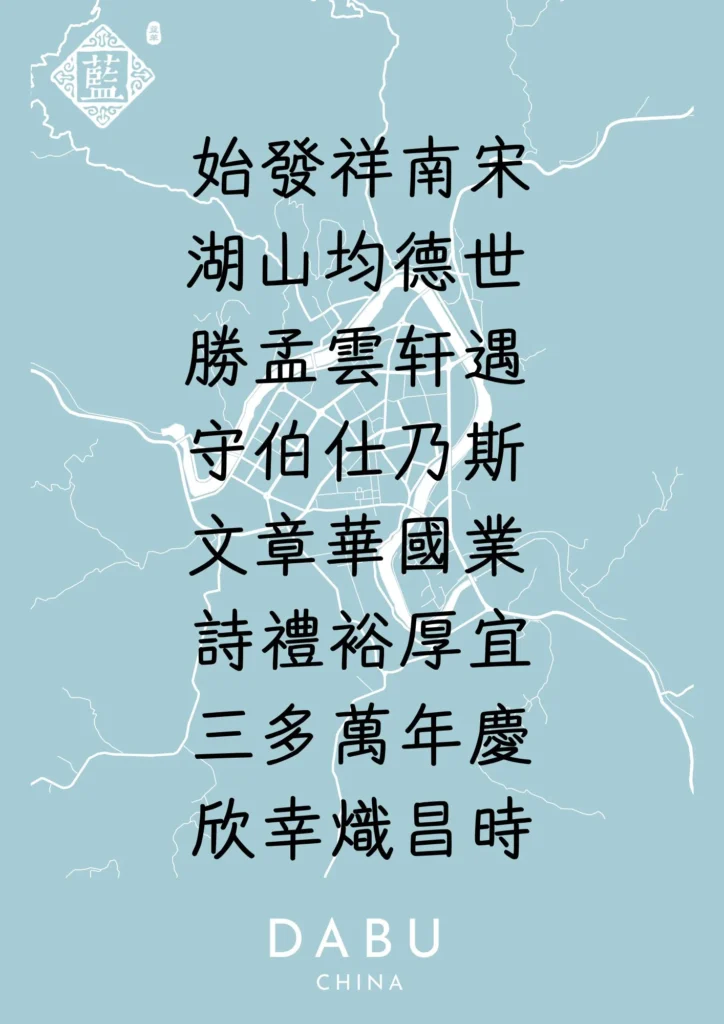
The Sacred Verses: A Blueprint for Generations
The Dabu Lam generation poem reads:
始發祥南宋,湖山均德世;
勝孟雲轩遇,守伯仕乃斯;
文章華國業,詩禮裕厚宜;
三多萬年慶,欣幸熾昌時.
This 40-character poem is a carefully crafted vision of family destiny that weaves together Confucian ideals of scholarship, virtue, and service with desires for prosperity, longevity, and cultural continuity. It begins by anchoring the family’s origins in the Southern Song Dynasty, then paints an idealized landscape where virtue characterizes every generation. The middle sections reveal profound intellectual and social aspirations, expressing hope that descendants will surpass even great philosophers while serving with dedication and achieving literary accomplishments that glorify the nation. The concluding verses embody the ultimate wishes of any Chinese family: the “three abundances” celebrated for “ten thousand years,” envisioning descendants living in times of flourishing prosperity.
始發祥南宋 (Generation 1-5) – Rooted in Imperial Glory
The opening line “始發祥南宋” (Beginning with auspicious fortune in the Southern Song) immediately establishes the family’s historical pedigree and temporal origins. By invoking the Southern Song Dynasty (1127-1279), the poem connects the Lam lineage to one of China’s most culturally and intellectually flourishing periods, an era renowned for its advances in philosophy, literature, and the arts. This opening is both a statement of fact and a declaration of aspiration—suggesting that the family’s fortune began with the cultural golden age of the Southern Song and that descendants should strive to embody the scholarly and artistic achievements of that remarkable period.
湖山均德世 (Generation 6-10) – Virtue Across Natural Beauty
The second line “湖山均德世” (Lakes and mountains all virtuous generations) creates a poetic landscape that merges natural beauty with moral excellence. The imagery of lakes and mountains evokes the classical Chinese aesthetic ideal of harmony between humanity and nature, while “均德世” emphasizes that virtue should characterize every generation without exception. This line suggests that just as lakes and mountains endure through time, so too should the family’s commitment to moral excellence persist across all generations, creating a legacy as enduring and beautiful as the natural world itself.
勝孟雲轩遇 (Generation 11-15) – Surpassing the Sages
“勝孟雲轩遇” (Surpassing Mencius, cloud pavilion encounters) sets an extraordinarily high intellectual and moral bar for future generations. Mencius, considered the second most important Confucian philosopher after Confucius himself, represents the pinnacle of moral and intellectual achievement in Chinese culture. The poem’s audacious suggestion that descendants should “surpass Mencius” reveals the family’s profound confidence in their potential for greatness. The “cloud pavilion encounters” imagery suggests elevated circumstances and refined social interactions, implying that this intellectual superiority will be accompanied by prestigious social positions and cultured environments.
守伯仕乃斯 (Generation 16-20) – Respecting Elders, Serving with Purpose
The fourth line “守伯仕乃斯” (Guarding elder service, thus this way) emphasizes fundamental Confucian values of filial piety and dedicated service. “守伯” speaks to the crucial importance of respecting and protecting one’s elders, while “仕” refers to government or scholarly service to society. The phrase “乃斯” (thus this way) suggests that this combination of family devotion and public service represents the proper path forward. This line bridges the personal and public spheres, indicating that true success requires both family loyalty and meaningful contribution to the broader community.
文章華國業 (Generation 21-25) – Literary Glory for the Nation
“文章華國業” (Literary works to glorify the nation’s enterprise) places scholarly achievement and patriotic service at the very heart of family values. This line envisions descendants creating literary works—whether poetry, prose, or scholarly treatises—that will bring honor not just to the family but to the entire nation. The character “華” (magnificence/glory) suggests that these literary contributions should be of the highest quality, while “國業” (national enterprise) indicates that personal achievement should serve the greater good of the country. This reflects the traditional Chinese ideal that individual success should ultimately benefit society as a whole.
詩禮裕厚宜 (Generation 26-30) – Abundance Through Culture and Ritual
The sixth line “詩禮裕厚宜” (Poetry and ritual propriety bring abundant goodness) emphasizes that cultural refinement and proper conduct lead to prosperity and well-being. “詩禮” represents the twin pillars of classical Chinese education—literary appreciation and ritual propriety—while “裕厚” suggests the abundance and prosperity that flow from such cultivation. The character “宜” (suitable/proper) indicates that this approach to life is not just beneficial but morally correct. This line reinforces that material prosperity should be the natural result of cultural and moral cultivation, not pursued as an end in itself.
三多萬年慶 (Generation 31-35) – Celebrating Eternal Blessings
“三多萬年慶” (Celebrating the three abundances for ten thousand years) invokes the traditional Chinese concept of “三多” (three abundances)—typically longevity, wealth, and many sons—representing comprehensive family blessings. The phrase “萬年” (ten thousand years) is not meant literally but expresses the desire for perpetual family continuance and prosperity. “慶” (celebrate) suggests that these blessings should be occasions for joy and gratitude rather than taken for granted. This line encapsulates the fundamental hopes that have driven Chinese families for millennia: health, prosperity, and the continuation of the family line.
欣幸熾昌時 (Generation 36-40) – Flourishing in Joyful Times
The final line “欣幸熾昌時” (Joyful and fortunate in times of flourishing prosperity) serves as the poem’s crescendo, envisioning descendants living in an era of unprecedented success and happiness. “欣幸” combines joy with good fortune, while “熾昌” suggests not just prosperity but dynamic, blazing success. The character “時” (time/era) indicates that this prosperity will characterize the entire historical period in which future generations live. This concluding vision transforms the poem from a set of moral guidelines into a prophecy of golden ages to come, suggesting that adherence to the poem’s values will ultimately lead to both personal fulfillment and broader societal flourishing.
A Living Heritage
As I reflect on this remarkable inheritance, I am struck by the profound privilege of sharing in a heritage that stretches nearly a thousand years. To carry a name drawn from verses composed during the Southern Song Dynasty, to be connected through an unbroken chain of poetry to ancestors who lived through the rise and fall of empires, feels both humbling and extraordinary. In an age where family histories often fade within a few generations, the Dabu Lam generation poem stands as a testament to the power of intentional cultural preservation.
Each time I speak my name or that of my relatives, I am participating in an ancient conversation between past and future, carrying forward not just syllables and sounds, but the dreams, values, and aspirations of countless generations who came before. This is more than genealogy—it is a form of immortality, where the hopes of the long-departed continue to shape the lives of the living, and where I, as the 27th generation, serve as both heir and steward of a legacy that will, with care and intention, continue to guide and inspire generations yet to come.
